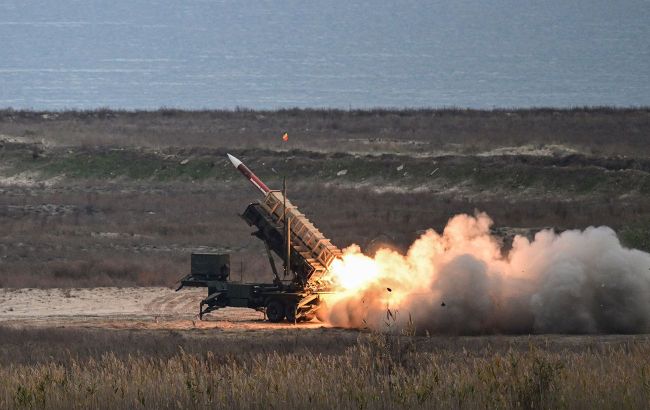Washington limits military aid to Europe, including Patriots
 Photo: MIM-104 Patriot anti-aircraft missile system (Getty Images)
Photo: MIM-104 Patriot anti-aircraft missile system (Getty Images)
The United States is pausing arms sales, including Patriot air defense systems, to certain European countries, according to The Atlantic.
According to sources cited by the publication, the first sign that the US approach to selling military equipment to Europe was changing came when Denmark moved closer to acquiring the Patriot air defense system, capable of intercepting ballistic missiles.
For several weeks, American and French negotiators pushed to finalize the deal, but as the deadline approached, the Pentagon suddenly lost interest.
"We couldn’t understand why. It seemed like a no-brainer, but they just weren't into it," said one contractor who was monitoring the discussions.
Patriot shortage
Officials familiar with the conversations told the outlet that, during a call with a State Department contractor, US Deputy Assistant Secretary of Defense Elbridge Colby said he did not see the value in certain arms sales to foreign countries.
He noted that he was not in favor of selling Patriot systems to Denmark because they are in short supply and should be reserved for US use if needed.
These remarks surprised some State Department staff, but they soon realized the issue went beyond Denmark. Current and former administration officials said the Pentagon has classified some types of weapons as scarce and is starting to block new European requests for these systems.
Sources did not specify how long the Patriot sale freeze will last, how many weapons are affected, or whether the list could expand. Exceptions for sales will be granted only rarely.
Concerns over Patriot shortages have been ongoing for months: Pentagon officials say the US has only about 25% of the interceptors needed to meet its own military plans.
Splits among allies
Meanwhile, The Atlantic notes, there is no European equivalent to the Patriot system. This makes the system highly valuable and in demand on a continent increasingly aware of the risks of aerial attacks, especially after Russian aircraft violated Estonia’s airspace.
"If the hold is long-term, it risks creating new rifts with allies, weakening their defenses at a time when Russia poses an imminent threat, and diminishing U.S. military influence across the continent," the article says.
The outlet also points out that the shift in delivery priorities could result in billions of dollars in lost government and private revenue, fewer jobs in the defense industry, restricted production, and halted research and development.
"The administration appears poised to prioritize replenishing American stockpiles over its relationships with longtime allies. But it would be unusual for such a crucial decision to be made without extensive input and review from agencies across the government, especially the State Department," the article adds.
Split within US defense agencies
Pentagon spokesperson Kingsley Wilson called any suggestion that Elbridge Colby is secretly making policy decisions "absurd," adding that Colby lives and breathes cooperation with his interagency and Department of War colleagues."
At the same time, State Department counselor, Michael Needham dismissed claims that the department was caught off guard.
"Anybody trying to create stories of a rift between State and the Department of War is doing so because they are opposed to President Trump's America First Agenda," Needham told the outlet.
Officials and observers of the Trump administration say this shift reflects Colby’s belief that only China has the ambition, resources, and military power to challenge the US as a global superpower.
Colby is convinced that the only way to prevent China’s push for global dominance is for the US to invest maximum resources in security in the Western Pacific, even at the cost of European security.
Ukraine and alternative suppliers
The Atlantic notes that several European countries sent some of their best weapons to Ukraine to help defend against Russia’s invasion, while replenishing their own stockpiles with American arms.
The war in Ukraine has strained reserves not just in the US but across Europe, sparking debates on how to rebuild defense industries.
One of the most sought-after systems has been the Patriot, which Denmark had planned to purchase. Heavy use of the system in Ukraine and by Israel in the Middle East has fueled concerns about stock levels and contributed to the current export block.
"This undermines the security of our European allies,but the current administration places a much lower priority on their security than previous administrations," said former Pentagon official Cancian.
Supporters argue that foreign arms sales help fund production expansion and R&D for new weapons systems. For instance, Boeing could produce the F-15EX fighter because Saudi Arabia ordered billions of dollars’ worth of jets. Export sales also enjoy strong Congressional support, thanks to the jobs they create. This could ultimately push the US to resume sales.
Seeking alternatives
Meanwhile, Deputy US Defense Secretary for Acquisition Cara Abercrombie in the Biden administration said that even if the sales freeze only slows deliveries, allies will inevitably turn to other suppliers.
"If you are a country in Europe that is very mindful of Russian missiles or drones flying into your airspace, you are anxious to make sure you’ve got interceptors in stock. If you’re told the already-two-year wait is now going to be a five-year wait, you will be very incentivized to start looking for other alternatives," she said.
Amid rising Russian threats, Denmark plans to purchase precision missiles and long-range drones. Last week, NATO ships intercepted a Russian vessel drifting toward Denmark after engine and power failures in Swedish waters.
Earlier this summer, Sweden and Denmark agreed to fund US arms purchases for Ukraine’s military.

